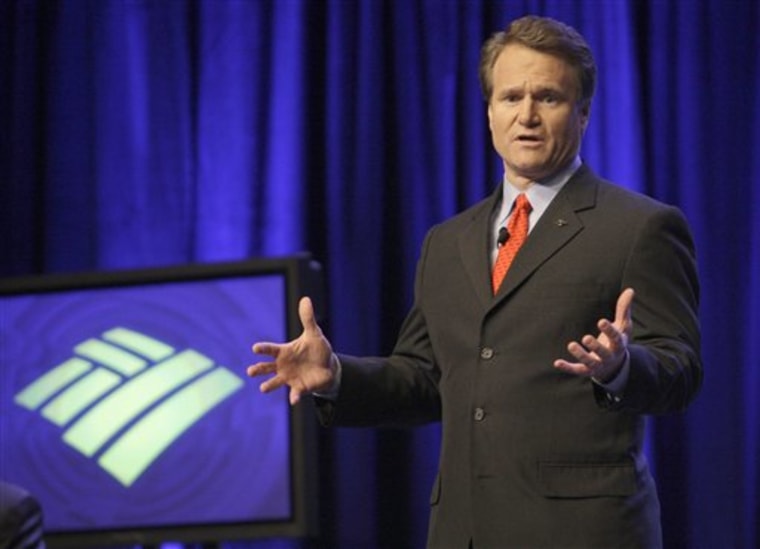In two weeks Brian Moynihan will take on what is sure to be the toughest job of his career: Running the nation's biggest bank.
He's got a lot on his plate. As CEO of Bank of America Corp., the former retail banking chief at the Charlotte-based bank will have to cool relations with regulators, overcome skeptics in Congress, handle investigations into the bank's purchase of Merrill Lynch, restore fractured morale and deal with cultural divides between the bank's several centers of power.
So how does a 50-year-old, Ohio-born lawyer who came to the bank as part of its 2004 purchase of FleetBoston Financial Corp. do that?
One word: execute.
In an interview Thursday with The Associated Press, Moynihan discussed some of the challenges left for him and the bank and how he expects to go about resolving them in the upcoming year.
"When we use the word execution, we mean key things that face our customers," Moynihan said. That includes rebuilding relationships with consumers who have had economic hardships, he said.
That's a big job for Bank of America, which has about 53 million relationships with customers, including individual consumers and businesses. That breadth helps make BofA particularly vulnerable to high unemployment, which remains at double-digit levels.
That can mean more losses on BofA's bread-and-butter business of making loans. BofA lost more than $2.2 billion in the third quarter as bad debt kept rising as consumers lost their jobs and struggled to pay their bills.
At the same time, Moynihan will have to juggle regulatory investigations into the bank's 2008 acquisition of Merrill Lynch while trying to repair relationships with regulators and members of Congress, who sharply criticized Lewis after the bank required billions in aid after acquiring Merrill.
"Bank of America isn't a broken mess," said Anton Schutz, portfolio manager of Burnham Financial Industries Fund and Burnham Financial Services Fund. "What Bank of America did is they paid too much for Merrill Lynch at the time, which created some issues."
Bank of America had reached a settlement with the Securities and Exchange Commission over accusations that it failed to tell shareholders that it authorized Merrill to pay up to $5.8 billion in bonuses. The company agreed to pay the government $33 million without admitting wrongdoing to settle the case, only to have a federal judge reject the agreement. The case is scheduled to go to trial Feb. 1.
Meanwhile, New York Attorney General Andrew Cuomo is expected to file charges related to bonuses against the bank and several high-ranking officials.
Moynihan also needs to boost company morale, which was severely shaken when the financial crisis hit in 2007, and grew with controversy over the bank's purchase of Merrill Lynch.
"I don't think people are worried about (Moynihan) repairing what's happened before him, but he needs a vision to carry the bank forward," said Jefferson Harralson, an analyst at Keefe, Bruyette & Woods Inc.
Moynihan said the bank's decision to payback $45 billion in government loans on Dec. 8 was a major step in bringing back employee and shareholder confidence.
The bank had received $25 billion from the government's Troubled Asset Relief Program when the credit crisis peaked last fall. It received another $20 billion shortly after it acquired Merrill Lynch in January in what would become a heavily scrutinized deal.
One other thing Moynihan has to accomplish successfully is to integrate some of the bank's most recent acquisitions, including Merrill Lynch and mortgage lender Countrywide Financial Corp.
With business units stretching from Boston to New York, and from Charlotte westward to California, Moynihan knows he must continue to work on merging the different cultures.
"Nobody's in a business that we haven't been in before," he said. "Every company's unique and it takes a while when you do an acquisition. The culture of the core company always changes."
Moynihan will succeed Ken Lewis, who announced in September that he would retire at the end of the year, setting off a scramble to find a replacement. The bank considered outside candidates, notably Bank of New York Mellon Corp.'s CEO Robert Kelly. Kelly told employees Monday that he wasn't going to leave.
Lewis voiced support for Moynihan at an event for several hundred bank employees in downtown Charlotte on Thursday, saying: "Brian needs one thing from you, he needs your help and your support."
Lewis called Moynihan a humble, caring and intelligent leader. "Another unique characteristic about him is he wanted the job," Lewis quipped, making light of the bank's months-long search for his successor.
Moynihan has already received a firsthand taste of what it's like to be in charge when he was grilled by lawmakers last month during a hearing on the Merrill takeover. Some of those in Congress, including Democrat Rep. Elijah Cummings, had questioned Moynihan's leadership skills.
Moynihan joined Bank of America as part of its 2004 purchase of FleetBoston Financial Corp., where he led global wealth and investment management. Over the past year he held a number of short-term stints throughout BofA, including general counsel, head of global corporate and investment banking and consumer banking chief.
"Hopefully he will be in this job much longer than those jobs," Lewis quipped.
